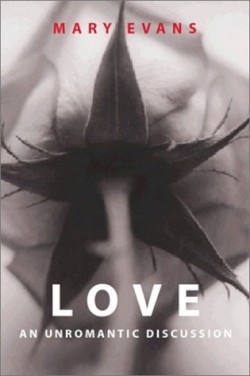Love
An Unromantic Discussion
What do Madame Bovary, Jane Eyre, and Bridget Jones have in common? They all suffer for love, of course.
They also work, for the author, as literary examples of the real-life pain that most people in the Western world experience at one time or another. While unlucky circumstances usually take the blame for this heartache, Evans argues that it’s not obstacles to love that cause the problem, but the notion of romantic love itself.
In this exhaustively researched book, Evans explains how unrealistic aspirations for loveÃ’specifically of the erotic varietyÃ’have preoccupied Western society for the past 200 years. Referencing sources ranging from Sigmund Freud to Susan Faludi, she demonstrates how perceptions of love have evolved over the decades, influenced by social developments including the women’s movement and changing attitudes toward sex.
Love’s one constant quality? It causes big trouble. In addition to the personal pain, there’s disruption to society when individuals devote themselves to chasing a romantic illusion at the cost of more lastingÃ’and attainableÃ’connections.
“Dare we entertain the idea of a world without love and could another vocabulary, in which words such as care, commitment and desire were more often used, actually make us happier?” Evans writes. “Would we, could we, live more fulfilled and contented lives without the emotional state which we describe as Ôlove’?”
Evans is a prominent feminist scholar and a professor at the Center for Women’s Studies, University of Kent at Canterbury. While her prose is generally crisp and accessible, she does occasionally get carried away with academic-speak, like in this passage, for example: “The question to be asked in the following pages is thus about the state of health of Ôlove’ at the beginning of the twenty-first century: is it a redundant concept in a secular, sexually liberalized society or does it still exist, and should we encourage its existence as a necessary, passionate assertion of our humanity against the calculative normality of late capitalism?” Fortunately, such lapses are rare.
Evans is not the first to decry the follies of erotic love and will surely not be the last. She does, though, make a thoughtful and compelling argument for loosening the headlock that romance has on society’s collective imagination. Not that anyone’s heart is likely to listen.
Reviewed by
Karen Holt
Disclosure: This article is not an endorsement, but a review. The publisher of this book provided free copies of the book to have their book reviewed by a professional reviewer. No fee was paid by the publisher for this review. Foreword Reviews only recommends books that we love. Foreword Magazine, Inc. is disclosing this in accordance with the Federal Trade Commission’s 16 CFR, Part 255.

